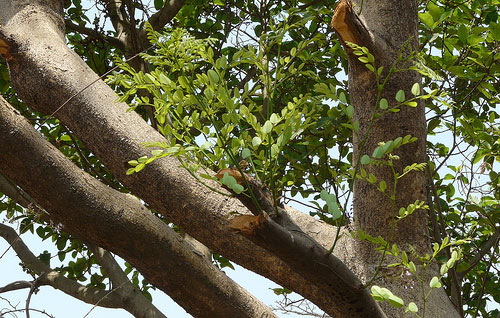Timber proposals widely adopted at CITES
Bangkok, Thailand, 12th March 2013—Dozens of commercially exploited timber species are to receive better international trade controls following negotiations at a United Nations meeting today.

Delegates to the Convention on International Trade in Endangered Species of Wild Fauna and Flora (CITES) meeting voted to include tropical hardwood species from Latin America, Asia and Madagascar in Appendix II of the Convention.
The outcome paralleled yesterday’s listing of marine species, which, like commercially exploited timber species, have previously featured little within CITES.
“Yesterday sharks, today timber: we appear to be witnessing a new direction for the world’s wildlife trade Convention,” said David Newton, TRAFFIC’s Director in East and Southern Africa.
Proposals adopted concerned ebonies from Madagascar Diospyros spp., Brazilian Rosewood Aniba rosaeodora, Thailand Rosewood Dalbergia cochinchinensis and further Dalbergia species from Central America and Madagascar.
The listing of timber species from Madagascar is particularly noteworthy: many have been subject to intense levels of uncontrolled and illegal international trade in recent years, despite the introduction of domestic legislation banning the export of precious woods in 2010. Many of the logs harvested in Madagascar are destined for markets in China and Europe.
Like other tropical hardwoods, the trees are very slow growing and are often sourced illegally from areas subject to widespread deforestation or from within protected areas.
“TRAFFIC warmly welcomes today’s decisions on timber species, especially the Malagasy ebonies and rosewoods, which will greatly strengthen Madagascar’s enforcement efforts to protect these commercially valuable but threatened species,” said Newton.
Many of the hardwood species are used in the manufacture of musical instruments, for example piano keys, also in furniture and decorative items, such as chess pieces.
“Today the meeting lived up to its expectations for timber species,” said Newton.
“We look forward to CITES regulations helping ensure the sustainability of tropical hardwood supplies.”
Proposals adopted were those for Malagasy ebony Diospyros spp., Brazilian Rosewood Aniba rosaeodora, Thailand Rosewood Dalbergia cochinchinensis, Black and Granadillo Rosewoods Dalbergia retusa and Dalbergia granadillo, Honduras Rosewood Dalbergia stevensonii and Malagasy rosewood Dalbergia spp.



